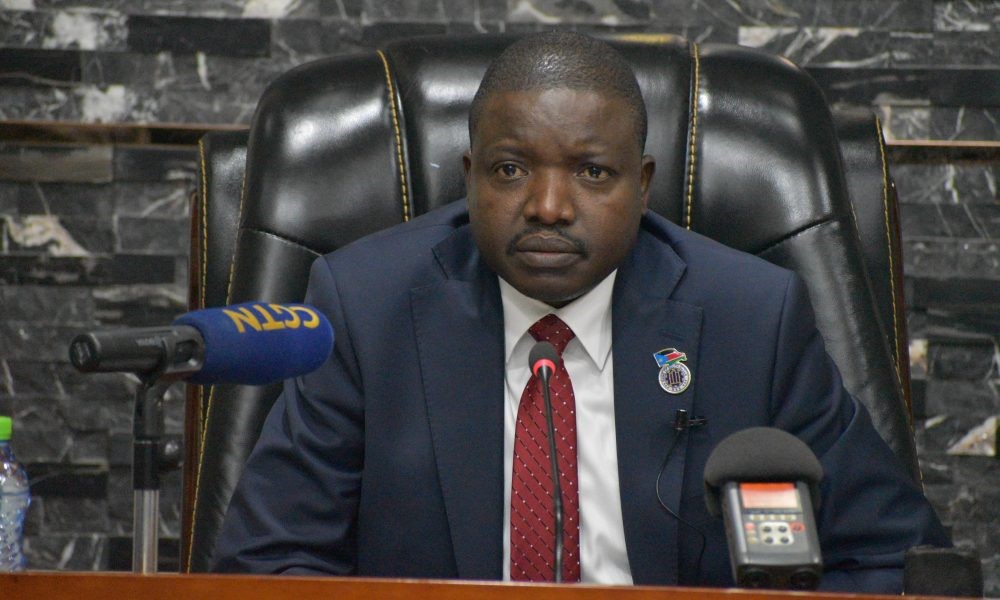By Bida Elly David
Central Bank is under immense pressure to contain the rising inflation and the weakening of the South Sudanese Pound against the US Dollar.
As of Tuesday, No. 1 Citizen Daily Newspaper established further downfall of South Sudanese pound against the United States Dollar, further exacerbating commodity prices.
A dollar now trades between SSP 1,400 and SSP 1,450 in the parallel market.
In a statement dated February 19, 2024, the Central Bank expressed concerns about the consistent rise in the value of the US Dollar, which has been causing a corresponding increase in commodity prices.
The Bank pledged to address the market instability.
“We are aware of the recent fluctuations in the exchange rate and its impact on prices; the bank is closely monitoring the recent developments in the foreign exchange market and remains committed to ensuring price stability and efficiency in the market,” BoSS promised in its statement.
Dr. James Alic Garang, the governor of the central bank, stated that the bank is undertaking measures to remedy the staggering pounds.
“The bank has considered intervening in the forex exchange market with a monetary policy rate that strengthens SSP through a weekly auction of foreign currency at a revised bank’s rate,” he noted.
The governor further said the bank has resolved the deployment of countermeasures to stabilize the exchange rate through the supply of additional resources to relieve pressure on the external sector and balance of payment (BoP).
“We are going to engage other stakeholders and development partners to support efforts aimed at fostering resilient and competitive foreign markets for sustainable economic development,” he underpinned.
Alic said the bank is also set out to intensify term deposit monetary operations aimed at smoothing market liquidity, monetary supply, and demand.
“The bank assures the public that it is unequivocally committed to its mandate of ensuring price stability and a sound financial system in the country,” he said.
Meanwhile, Changkouth Bichiok, chairperson of the specialized committee for finance and economic planning at the National Transitional Legislative Assembly (R-TNLA), attributed the market instability to poor coordination and dependence on imports.
The lawmaker stated in an earlier interview that positive solutions to the economy will be guaranteed if the concerned institutions engage in proper coordination and work together.
On the issue of the dollar’s rise, Mr. Changkouth stated that it is a global phenomenon that the USD takes the lead in countries with weak economies that do not support agriculture.
He stated that the Ministry of Trade and Industry has a bigger role to play in price control for imported and exported goods.
Changkouth highlighted a serious weakness in the agricultural sector, saying there is no progress on local food production.
With the weakness, he noted that traders take advantage of hiking prices with claims of buying goods in dollars from outside.
“What we need to do is embrace our agriculture; we need to produce, and we need to make our own food, because even the tomatoes and the water, we are importing them from somewhere,” the finance committee chair noted.
The MP underscored that with the promotion of domestic production, the value of the foreign currency will depreciate, saying people will not need them anymore.
“South Sudan mostly depends on imports, which is why we need dollars more than anything, but if we have production locally, we don’t need dollars,” he lamented.
According to him, the parliament, right after the resumption, will meet the finance and trade institutions for findings on the devastating economy.
He stated that one body cannot bring total economic stability, but rather different actors within the government.
“The body responsible for stabilizing the economy this time is not only one body, but there are a number of actors that are supposed to keep up, especially the Ministry of Finance and the Ministry of Trade,” he outlined.
He stated that his committee has already started engaging with the Ministry of Trade over commodity price control.
Recently, an economic analyst blasted the central bank and chambers of commerce for having failed to control market inflation.




